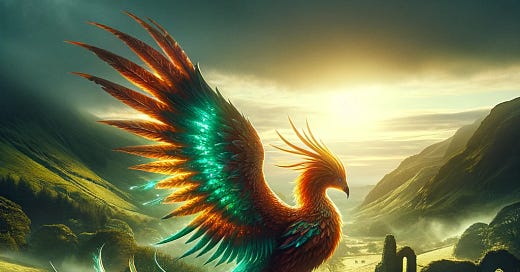Myth of the Day: Adar Llwch Gwin
Dive into ancient Welsh tales to uncover radiant birds with power, loyalty, and lessons in the weight of words.
Region/Culture: Wales, Western Europe
Mythos: Celtic Mythology, Welsh Mythology
Primary Type/Nature: Fairy Folk and Spirit Beings
Mythical Attributes: Giant birds associated with the warrior hero Drudwas ap Tryffin.
Role in Mythos: The Adar Llwch Gwin are said to understand human languages and obey the commands of their master.
Relation to Humans: These majestic birds were gifted to Drudwas by his fairy bride. However, an error in Drudwas's command led the birds to attack him instead of his intended target.
Ah, the Adar Llwch Gwin. A rather splendid creature from the rich tapestry of Welsh mythology. Now, let's embark on a journey through time, across rolling hills, and into the heart of ancient tales to discover the wonders of this mythical bird.
Imagine, if you will, a great bird with shimmering feathers that look as if they've been plucked straight from the dreams of the Aurora Borealis. These aren't just any birds; they're large enough to carry off a fully-grown warrior or an absent-minded bard, which, if you knew some of the bards in ancient Wales, might not have been a terrible idea. Now, don't get the wrong impression. These birds weren't raptors or vultures; they were elegant, proud, and radiant.
Legend says these majestic beings, the Adar Llwch Gwin, were the loyal companions of a noble figure named Drudwas ap Tryffin. But how did a mere mortal come to befriend such wondrous creatures? Ah, it’s all down to birthrights and a sprinkle of destiny. They were given to him as a gift. And not just from anyone. These were a gift from the fair folk, the Tylwyth Teg, creatures of magic and moonlight, living just on the edges of our reality.
There's a tale, whispered by the winds and told by the ancient bards, where these birds played a pivotal role. Drudwas, perhaps feeling a tad bit overconfident by his association with these creatures, made a small, well, let’s call it a wager. He bet that his Adar Llwch Gwin could defeat King Arthur's knights. In the heat of the moment, Drudwas instructed his feathery companions to attack the first group of warriors they saw. However, fate, always a player in such tales, played its card. The first warriors the birds chanced upon were, unfortunately, Drudwas’s own men. Oh, the irony! Time does have a peculiar sense of humor, doesn’t it?
Now, on to their abilities. Apart from their immense size and strength, enough to carry away a warrior, remember? They possessed an innate ability to understand human commands. As you've seen with Drudwas, this can be both a blessing and a curse. Their intelligence, combined with their loyalty, made them formidable allies.
Yet, like every mythical creature spun from the threads of imagination and folklore, they had a weakness. Their loyalty was unwavering, but it was bound to the commands they were given. They lacked the discretion to differentiate between what was intended and what was spoken. Communication, after all, is a tricky thing. Isn't it always the way? The most powerful of creatures, undone by the simplest of misunderstandings.
And so, dear reader, in the radiant plumes of the Adar Llwch Gwin, we find tales of loyalty, power, and the timeless lesson of being careful with our words. For in every corner of our world, magic or mundane, it's often not what we say, but what we mean that truly matters.
Suggested Further Reading
The Mammoth Book of Celtic Myths and Legends by Peter Berresford Ellis
Welsh Witchcraft: A Guide to the Spirits, Lore, and Magic of Wales by Mhara Starling
Explore more myths and wonders by visiting godsandmonsters.info.





